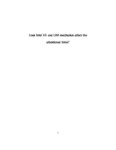Does Brief Focused Attention and Open Monitoring Meditation Affect the Attentional Blink?
| dc.contributor.author | Sharpe, Paul | |
| dc.contributor.author | Whalley, Ben | |
| dc.contributor.author | Mitchell, CJ | |
| dc.date.accessioned | 2021-10-07T16:15:34Z | |
| dc.date.available | 2021-10-07T16:15:34Z | |
| dc.date.issued | 2021-10 | |
| dc.identifier.issn | 1868-8527 | |
| dc.identifier.issn | 1868-8535 | |
| dc.identifier.uri | http://hdl.handle.net/10026.1/18000 | |
| dc.description.abstract |
Objectives: A number of studies indicate that meditation training affects performance on the attentional blink (AB). This is taken as evidence that meditation has an influence on attentional processes. One such experiment found the AB to be reduced after adult, non-meditators completed a brief, single session of open monitoring meditation (OM). This was compared to two control conditions: focused attention meditation (FA) and a relaxation condition in which participants read magazines. The objective of the present study was to assess whether this effect could be replicated with a larger sample. Methods: This experiment consisted of forty participants in each of three groups: FA, OM and relaxation. After the inductions, performance was measured on a rapid serial visual presentation (RSVP) task consisting of two targets (T1 and T2). The AB and overall target accuracy were compared between groups using Bayesian and frequentist statistics. Results: There was no evidence of attentional blink differences between the FA, OM and control conditions. However, overall task accuracy was higher in the meditation groups than in the relaxation group for both conditional T2 accuracy and T1 accuracy. The results indicate that in non-meditators, any reduction in attentional blink after brief OM, relative to brief FA, is likely to be small (d = 0.27 [− 0.17, 0.72]). Conclusions: In non-meditators, there was no evidence that brief OM affects attention allocation differently to FA, such that it reduces the attentional blink. However, brief meditation may affect the allocation of attentional resources in ways which improve accuracy on the attentional blink task. This interpretation is supported by evidence that, over the course of the RSVP task, arousal increased to a greater extent in the meditation groups than in the the relaxation group. | |
| dc.format.extent | 2430-2438 | |
| dc.language | en | |
| dc.language.iso | en | |
| dc.publisher | Springer Verlag | |
| dc.rights | Attribution-NonCommercial-NoDerivatives 4.0 International | |
| dc.rights | Attribution-NonCommercial-NoDerivatives 4.0 International | |
| dc.rights | Attribution-NonCommercial-NoDerivatives 4.0 International | |
| dc.rights | Attribution-NonCommercial-NoDerivatives 4.0 International | |
| dc.rights | Attribution-NonCommercial-NoDerivatives 4.0 International | |
| dc.rights.uri | http://creativecommons.org/licenses/by-nc-nd/4.0/ | |
| dc.rights.uri | http://creativecommons.org/licenses/by-nc-nd/4.0/ | |
| dc.rights.uri | http://creativecommons.org/licenses/by-nc-nd/4.0/ | |
| dc.rights.uri | http://creativecommons.org/licenses/by-nc-nd/4.0/ | |
| dc.rights.uri | http://creativecommons.org/licenses/by-nc-nd/4.0/ | |
| dc.subject | Mindfulness | |
| dc.subject | Meditation | |
| dc.subject | Attentional blink | |
| dc.subject | Attention | |
| dc.subject | Replication | |
| dc.title | Does Brief Focused Attention and Open Monitoring Meditation Affect the Attentional Blink? | |
| dc.type | journal-article | |
| dc.type | Journal Article | |
| plymouth.author-url | https://www.webofscience.com/api/gateway?GWVersion=2&SrcApp=PARTNER_APP&SrcAuth=LinksAMR&KeyUT=WOS:000685704600002&DestLinkType=FullRecord&DestApp=ALL_WOS&UsrCustomerID=11bb513d99f797142bcfeffcc58ea008 | |
| plymouth.issue | 10 | |
| plymouth.volume | 12 | |
| plymouth.publication-status | Published | |
| plymouth.journal | Mindfulness | |
| dc.identifier.doi | 10.1007/s12671-021-01709-2 | |
| plymouth.organisational-group | /Plymouth | |
| plymouth.organisational-group | /Plymouth/Faculty of Health | |
| plymouth.organisational-group | /Plymouth/Faculty of Health/School of Psychology | |
| plymouth.organisational-group | /Plymouth/REF 2021 Researchers by UoA | |
| plymouth.organisational-group | /Plymouth/REF 2021 Researchers by UoA/UoA04 Psychology, Psychiatry and Neuroscience | |
| plymouth.organisational-group | /Plymouth/Research Groups | |
| plymouth.organisational-group | /Plymouth/Research Groups/Centre for Brain, Cognition and Behaviour (CBCB) | |
| plymouth.organisational-group | /Plymouth/Research Groups/Centre for Brain, Cognition and Behaviour (CBCB)/Behaviour | |
| plymouth.organisational-group | /Plymouth/Research Groups/Plymouth Institute of Health and Care Research (PIHR) | |
| plymouth.organisational-group | /Plymouth/Users by role | |
| plymouth.organisational-group | /Plymouth/Users by role/Academics | |
| dcterms.dateAccepted | 2021-07-15 | |
| dc.rights.embargodate | 2022-8-17 | |
| dc.identifier.eissn | 1868-8535 | |
| dc.rights.embargoperiod | Not known | |
| rioxxterms.versionofrecord | 10.1007/s12671-021-01709-2 | |
| rioxxterms.licenseref.uri | http://creativecommons.org/licenses/by-nc-nd/4.0/ | |
| rioxxterms.licenseref.startdate | 2021-10 | |
| rioxxterms.type | Journal Article/Review |



